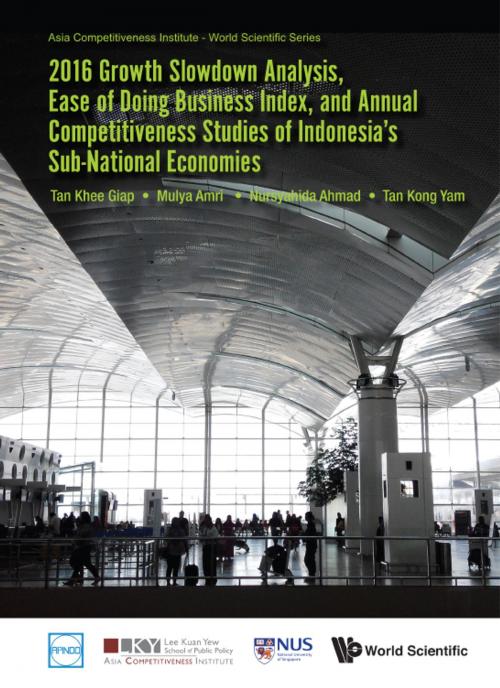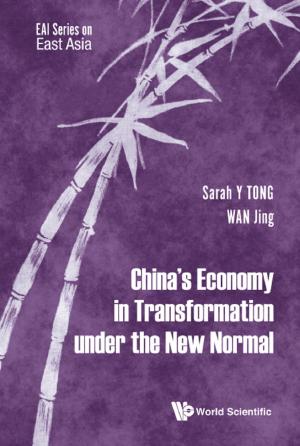2016 Growth Slowdown Analysis, Ease of Doing Business Index, and Annual Competitiveness Studies of Indonesia's Sub-National Economies
Business & Finance, Economics, International Economics, Economic Development| Author: | Khee Giap Tan, Mulya Amri, Nursyahida Ahmad;Kong Yam Tan | ISBN: | 9789813226890 |
| Publisher: | World Scientific Publishing Company | Publication: | November 10, 2017 |
| Imprint: | WSPC | Language: | English |
| Author: | Khee Giap Tan, Mulya Amri, Nursyahida Ahmad;Kong Yam Tan |
| ISBN: | 9789813226890 |
| Publisher: | World Scientific Publishing Company |
| Publication: | November 10, 2017 |
| Imprint: | WSPC |
| Language: | English |
This book is an update of the annual flagship study by the Asia Competitiveness Institute at the Lee Kuan Yew School of Public Policy, National University of Singapore, that dissects Indonesia's sub-national competitiveness at both the provincial level (covering 34 provinces) and the regional level (covering six major island groups). Based on a rich dataset of 100 indicators, the study covers four environments of competitiveness: (1) Macroeconomic Stability, (2) Government and Institutional Setting, (3) Financial, Businesses, and Manpower Conditions, and (4) Quality of Life and Infrastructure Development. It also presents each province and region's comparative strengths and weaknesses, and conducts "what-if" policy simulations to propose policy suggestions.
Aside from exploring competitiveness, the book also features empirical research on the determinants of growth slowdown in Indonesian provinces and its impact on policy implications. It also features the inaugural Ease of Doing Business Index on Attractiveness to Investors, Business Friendliness and Competitive Policies (EDB Index ABC) for Indonesian provinces. Coupled with practical insights and policy implications, this book is a recommended read for policymakers, researchers, and the general audience interested in Indonesia's economic development.
Contents:
- Introduction
- 2016 Annual Update on Competitiveness Analysis of Indonesian Provinces
- 2016 Annual Update on Competitiveness Analysis of Indonesian Regions
- Growth Slowdown Analysis by Income Thresholds for Indonesia's Sub-National Economies
- 2016 Inaugural Ease of Doing Business Index on Attractiveness to Investors, Business Friendliness and Competitive Policies (EDB Index ABC) for Indonesian Provinces
- Conclusion
Readership: Policymakers, researchers, and the general audience interested in Indonesia's economic development.
Key Features:
- This is the only annual study of Indonesia's sub-national competitiveness landscape which is conducted impartially and aimed towards Indonesian policymakers as well as the international audience
- The book presents a comprehensive analysis based on an extensive dataset sourced from formal statistics as well as surveys conducted jointly with the government, business owners, and academic institutions in all Indonesian provinces
- In this installment of the series, the book features an empirical study on growth slowdown by income thresholds in Indonesia's provinces as well as the inaugural Ease of Doing Business Index on Attractiveness to Investors, Business Friendliness and Competitive Policies (EDB Index ABC) for Indonesian provinces
This book is an update of the annual flagship study by the Asia Competitiveness Institute at the Lee Kuan Yew School of Public Policy, National University of Singapore, that dissects Indonesia's sub-national competitiveness at both the provincial level (covering 34 provinces) and the regional level (covering six major island groups). Based on a rich dataset of 100 indicators, the study covers four environments of competitiveness: (1) Macroeconomic Stability, (2) Government and Institutional Setting, (3) Financial, Businesses, and Manpower Conditions, and (4) Quality of Life and Infrastructure Development. It also presents each province and region's comparative strengths and weaknesses, and conducts "what-if" policy simulations to propose policy suggestions.
Aside from exploring competitiveness, the book also features empirical research on the determinants of growth slowdown in Indonesian provinces and its impact on policy implications. It also features the inaugural Ease of Doing Business Index on Attractiveness to Investors, Business Friendliness and Competitive Policies (EDB Index ABC) for Indonesian provinces. Coupled with practical insights and policy implications, this book is a recommended read for policymakers, researchers, and the general audience interested in Indonesia's economic development.
Contents:
- Introduction
- 2016 Annual Update on Competitiveness Analysis of Indonesian Provinces
- 2016 Annual Update on Competitiveness Analysis of Indonesian Regions
- Growth Slowdown Analysis by Income Thresholds for Indonesia's Sub-National Economies
- 2016 Inaugural Ease of Doing Business Index on Attractiveness to Investors, Business Friendliness and Competitive Policies (EDB Index ABC) for Indonesian Provinces
- Conclusion
Readership: Policymakers, researchers, and the general audience interested in Indonesia's economic development.
Key Features:
- This is the only annual study of Indonesia's sub-national competitiveness landscape which is conducted impartially and aimed towards Indonesian policymakers as well as the international audience
- The book presents a comprehensive analysis based on an extensive dataset sourced from formal statistics as well as surveys conducted jointly with the government, business owners, and academic institutions in all Indonesian provinces
- In this installment of the series, the book features an empirical study on growth slowdown by income thresholds in Indonesia's provinces as well as the inaugural Ease of Doing Business Index on Attractiveness to Investors, Business Friendliness and Competitive Policies (EDB Index ABC) for Indonesian provinces















